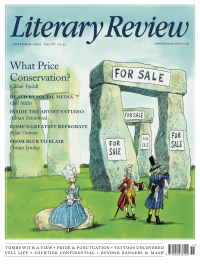Nora Duckett
Think of the Children
Behind Closed Doors: Why We Break Up Families – and How to Mend Them
By Polly Curtis
Virago 320pp £16.99
In Behind Closed Doors, Polly Curtis tells the story of how families are broken down by poverty and broken up by social workers. Her book is based on the premise that children who need the state to intervene to care for them are being seriously let down. We learn about risk-averse social workers taking too many children away from parents whose ‘biggest crime in society’s eyes’ is ‘poor parenting’. (In fact, the power to order that children be taken into care resides solely with the police and the courts.) Curtis believes that children’s services in Britain are at breaking point and that, owing to the absence of adequate resources enabling children to remain at home safely, too many are removed and placed in care, where outcomes may be as poor as in their family homes. ‘Rather than fixing a housing issue,’ she states, ‘we remove a child.’
There’s a wide spectrum of scenarios in which social workers may be required to intervene to safeguard a child’s wellbeing. They may be confronted with a teenager who cuts herself, runs away from school and refuses to go home, alleging ill treatment by family members; with a pre-mobile infant with an unexplained bruise; with a young person caring for a drug-dependent parent; with a parent repeatedly arriving at school drunk to collect children; with a disabled child considered morbidly obese, whose parents are unable or unwilling to provide a healthy diet; or with a teenager who sexually abuses a younger sibling or is physically threatening and violent to other family members.
A thread throughout Curtis’s book is that a child removed from their parents and placed in care is not necessarily any better off than one remaining in the family. She states, ‘no one is really confident that we are consistently making the right choice between an abusive or

Sign Up to our newsletter
Receive free articles, highlights from the archive, news, details of prizes, and much more.@Lit_Review
Follow Literary Review on Twitter
Twitter Feed
Under its longest-serving editor, Graydon Carter, Vanity Fair was that rare thing – a New York society magazine that published serious journalism.
@PeterPeteryork looks at what Carter got right.
Peter York - Deluxe Editions
Peter York: Deluxe Editions - When the Going Was Good: An Editor’s Adventures During the Last Golden Age of Magazines by Graydon Carter
literaryreview.co.uk
Henry James returned to America in 1904 with three objectives: to see his brother William, to deliver a series of lectures on Balzac, and to gather material for a pair of books about modern America.
Peter Rose follows James out west.
Peter Rose - The Restless Analyst
Peter Rose: The Restless Analyst - Henry James Comes Home: Rediscovering America in the Gilded Age by Peter Brooks...
literaryreview.co.uk
Vladimir Putin served his apprenticeship in the KGB toward the end of the Cold War, a period during which Western societies were infiltrated by so-called 'illegals'.
Piers Brendon examines how the culture of Soviet spycraft shaped his thinking.
Piers Brendon - Tinker, Tailor, Sleeper, Troll
Piers Brendon: Tinker, Tailor, Sleeper, Troll - The Illegals: Russia’s Most Audacious Spies and the Plot to Infiltrate the West by Shaun Walker
literaryreview.co.uk